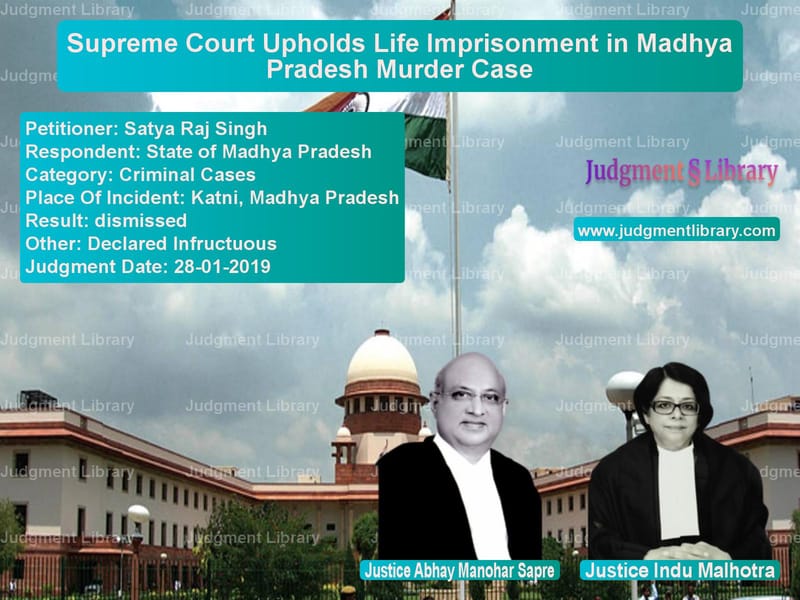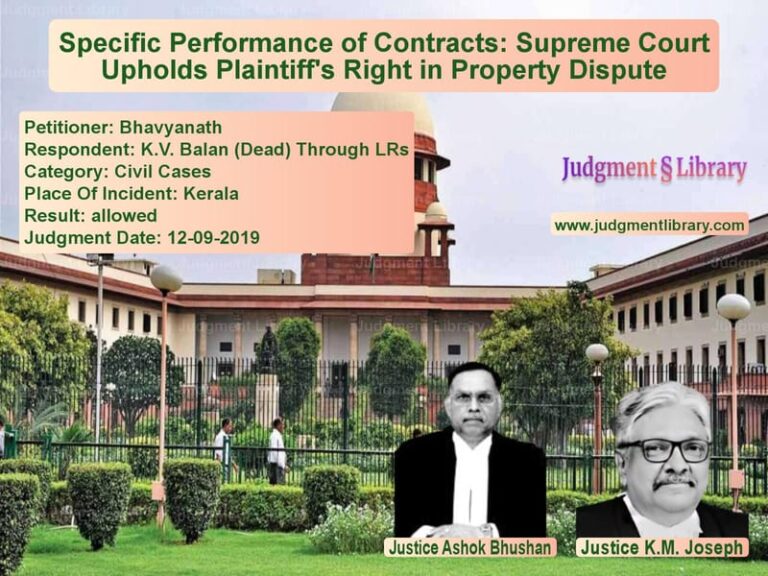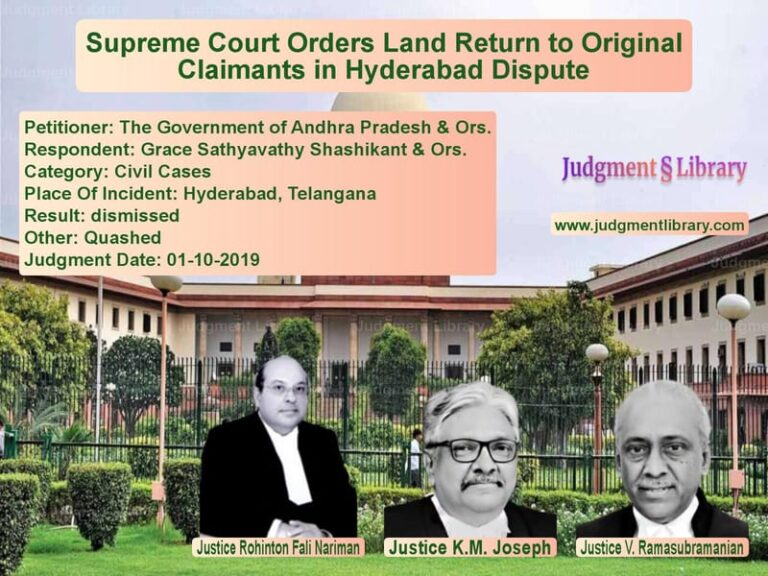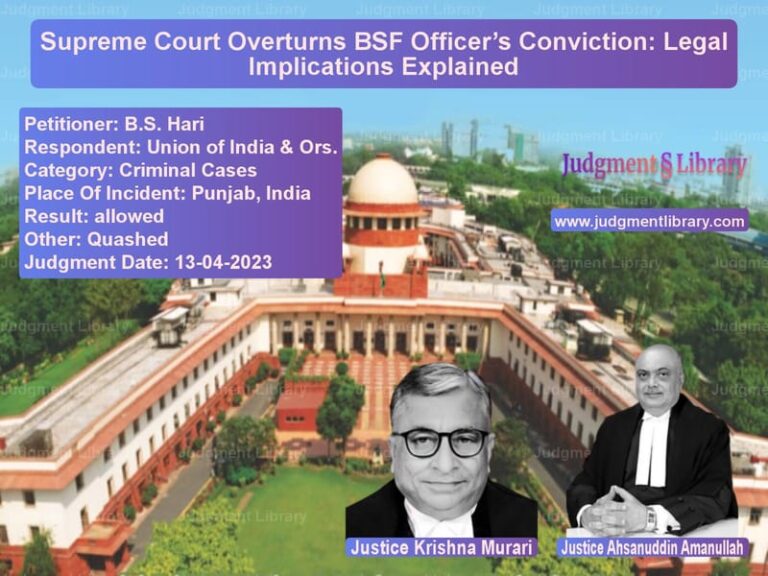Supreme Court Upholds Life Imprisonment in Madhya Pradesh Murder Case
The case of Satya Raj Singh vs. State of Madhya Pradesh involved the brutal murder of a man named Bhaiya alias Narendra. The Supreme Court had to determine whether the conviction and life sentence handed down by the lower courts were justified based on the evidence and legal principles. The ruling reinforced the standards for criminal conviction and dismissed the appeal, affirming the appellant’s guilt.
Background of the Case
On 19th September 1999, at approximately 7:00 PM, Bhaiya alias Narendra and his friends were sitting and chatting in their village when the appellant, Satya Raj Singh, and his accomplices arrived and lured the victim away under the pretext of discussing an urgent matter. Soon after, the victim was found attacked with a sharp-edged weapon, suffering fatal injuries.
The prosecution charged the appellant under Section 302/34 of the Indian Penal Code (IPC) for murder. The Additional Sessions Judge, Katni, found Satya Raj Singh guilty, sentencing him to life imprisonment with a fine of Rs. 1000/-, with an additional three months of rigorous imprisonment in case of default. The Madhya Pradesh High Court upheld this conviction. Dissatisfied with the ruling, the appellant approached the Supreme Court.
Petitioner’s Arguments (Satya Raj Singh)
- The conviction was based on unreliable eyewitness testimony.
- The First Information Report (FIR) was lodged late, raising doubts about the prosecution’s case.
- The trial court erred in believing the prosecution’s version without sufficient corroborative evidence.
- There were inconsistencies in the statements of prosecution witnesses.
Respondent’s Arguments (State of Madhya Pradesh)
- The prosecution provided consistent and credible eyewitness testimony.
- The medical and forensic evidence corroborated the eyewitness accounts.
- The delay in filing the FIR was reasonable given the circumstances, including the remoteness of the crime scene.
- The trial court correctly appreciated the evidence and found the appellant guilty beyond a reasonable doubt.
Supreme Court’s Judgment
The Supreme Court, led by Justices Abhay Manohar Sapre and Indu Malhotra, upheld the conviction and dismissed the appeal. The key findings were:
- Credibility of Eyewitnesses: The Court found the testimonies of the prosecution witnesses consistent and reliable, confirming that the appellant attacked the victim with a sharp-edged weapon.
- Medical and Forensic Evidence: The post-mortem report supported the prosecution’s case, linking the injuries to the alleged weapon.
- Delay in Filing the FIR: The Court held that the delay was justified given the circumstances and did not weaken the prosecution’s case.
- Absence of Contradictions: The Court rejected the appellant’s argument about inconsistencies in witness statements, ruling that minor variations did not affect the credibility of the evidence.
Observations from the Judgment
The Court cited precedents, including Lachhman Singh vs. State (1952), emphasizing that the Supreme Court does not re-evaluate factual findings unless gross injustice is evident.
“The function of this Court is not to re-assess evidence but to determine whether the lower courts’ findings were based on proper appreciation of the facts.”
Regarding the delay in lodging the FIR, the Court stated:
“The Police Station was 25 km away from the crime scene, and in such circumstances, a short delay in lodging the FIR does not render the prosecution’s case unreliable.”
Impact of the Judgment
This ruling has significant implications for criminal law:
- It reaffirms that appellate courts should not interfere with factual findings unless there is a miscarriage of justice.
- It upholds the principle that minor discrepancies in witness statements do not automatically weaken a case.
- It ensures that procedural delays, if reasonable, do not undermine a well-established prosecution case.
Conclusion
The Supreme Court’s decision in Satya Raj Singh vs. State of Madhya Pradesh reinforces the importance of properly appreciating eyewitness and forensic evidence in criminal cases. By upholding the conviction and sentence, the Court has maintained the integrity of the criminal justice system and sent a strong message against violent crimes.
Petitioner Name: Satya Raj Singh.Respondent Name: State of Madhya Pradesh.Judgment By: Justice Abhay Manohar Sapre, Justice Indu Malhotra.Place Of Incident: Katni, Madhya Pradesh.Judgment Date: 28-01-2019.
Don’t miss out on the full details! Download the complete judgment in PDF format below and gain valuable insights instantly!
Download Judgment: Satya Raj Singh vs State of Madhya Prad Supreme Court of India Judgment Dated 28-01-2019.pdf
Direct Downlaod Judgment: Direct downlaod this Judgment
See all petitions in Murder Cases
See all petitions in Bail and Anticipatory Bail
See all petitions in Attempt to Murder Cases
See all petitions in Judgment by Abhay Manohar Sapre
See all petitions in Judgment by Indu Malhotra
See all petitions in dismissed
See all petitions in Declared Infructuous
See all petitions in supreme court of India judgments January 2019
See all petitions in 2019 judgments
See all posts in Criminal Cases Category
See all allowed petitions in Criminal Cases Category
See all Dismissed petitions in Criminal Cases Category
See all partially allowed petitions in Criminal Cases Category







